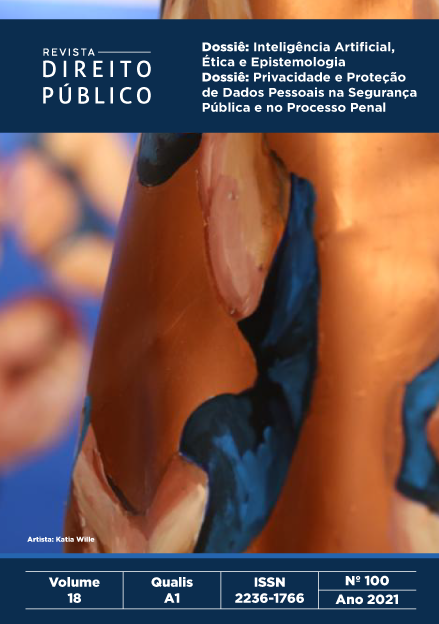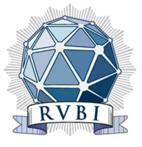What is it Like To Be an Artificial Intelligence? Nagel’s View From Nowhere and Artificial Intelligence as Subject of Law
DOI:
https://doi.org/10.11117/rdp.v18i100.5876Palavras-chave:
Artificial Intelligence, Subject of Law, Procedural Theory.Resumo
This paper has as its research problem the following question: what is it like to be an artificial intelligence? It aims to critically analyze the epistemological and semantic aspects developed by Thomas Nagel in What is it like to be a bat and The View from Nowhere, demonstrating the relationship between physicalism and subjectivity and its application to artificially intelligent beings. We chose to approach these two works because of the author’s importance in analytical philosophy and the approach to consciousness. The analysis shows that the defense of artificial intelligence as a subject of law is intrinsically based on physicalism. However, in refuting it, Nagel does not offer an alternative outside the scope of dualism. Thus, the Procedural Theory of the Subject of Law is developed with stages of emancipation of the being against the law. As a result, it is verified that the reductive physicalist vision is insufficient to substantiate the condition of the subject of law of an artificial intelligence as a legal and political being in the social order. However, if the three stages of its formation (emancipation, interspecies recognition, and personification) are observed, the possibility of achieving the condition under analysis is assumed. It is concluded that it is unverifiable to know what it is like to be an artificial intelligence. In the current scientific stage, an artificially intelligent being cannot (yet) be considered a subject of law, under penalty of characterization of instrumentalism. The methodology of integrated, analytical, deductive, and bibliographic research is used to obtain these results and conclusions.
Downloads
Referências
BERKLEY, George. A treatise concerning the principles of Human Knowledge. 1710, seções 2 e 23. Available in: https://www.earlymoderntexts.com/assets/pdfs/berkeley1710.pdf. Accessed 10 aug. 2021.
BOSTROM, N. Superinteligência. Rio de Janeiro: Darkside, 2018.
BOSTROM, N. The ethics of artificial intelligence. In Ramsey, W.; Frankish, K. (org.) Draft for Cambridge Handbook of Artificial Intelligence. Cambridge University Press, 2011.
ČERKÃ, Paulius; GRIGIENĖ, Jurgita; SIRBIKYTĖ, Gintãrė. Liãbility for dãmãges cãused by Artificiãl Intelligence. Computer Lãw & Security Review, Elsevier, v. 31, n. 3, p. 376-389, jun. 2015.
DIVINO, S. B. S. Inteligência Artificial como sujeito de direito: construção e teorização crítica sobre pessoalidade e subjetivação. Revista de Bioética y Derecho, v. 52, p. 237-252, 2021.
DIVINO, S. B. S. Procedural theory of the subject of law and non-human animals: criteria for recognition of legal subjectivity from the perspective of critical theory. Revista Brasileira de Políticas Públicas, Brasília, v. 10, n. 3. p181-195, 2020.
FOUCAULT, M. Em defesa da sociedade. Curso no Collège de France (1975-1976). São Paulo: Martins Fontes, 1999.
FOUCAULT, M. O que é a crítica? Seguido de A cultura de si. Lisboa: Texto & Grafia, 2015.
FOUCAULT, M. O sujeito e o poder. In: Rabinow, P.; Dreyfus, H. L. (Org.). Michel Foucault: uma trajetória filosófica (para além do estruturalismo e da hermenêutica). Rio de Janeiro: Forense Universitária, p. 231-249, 1995.
GOLDBERG, D. E.; HOLLAND, J. H. Genetic algorithms and machine learning. In Machine learning. Vol. 3. Switzerland: 1988, p. 95-99.
HERVADA, J. O que é o direito? A moderna resposta do realismo jurídico. São Paulo: Martins Fontes. 2006.
HONNETH, A. Luta por reconhecimento. São Paulo: Editora 34, 2017.
KELSEN, H. Pure theory of Law. London: Cambridge University Press, 1967.
LUHMANN, N. Sociologia do Direito. Vol. I. Rio de Janeiro: Tempo Brasileiro, 1983.
MARTINS-COSTA, J. Indivíduo, Pessoa, Sujeito de Direitos: contribuições renascentistas para uma história dos conceitos jurídicos. Philia&Filia. 1, 1, 69-95, 2010.
MCCARTHY, J. What is artificial intelligence? Stanford University, 2007.
NAGEL, T. The View from nowhere. New York: Oxoford University Press, 1986.
NAGEL, T. What is it like to be a Bat? In: The Philosophical Review. Duke University Press v. 83, n. 4 (Oct.), p. 438-439, 1974.
NEUMANN, Franz. O conceito de liberdade política. Cadernos de Filosofia Alemã, São Paulo, n. 22, p. 107-154, 2013.
Reedy, C. Kurzweil Claims That the Singularity Will Happen by 2045. Futurism. 2017. Available in: https://futurism.com/kurzweil-claims-that-the-singularity-will-happen-by-2045. Acessed 10 aug. 2021
RUSSELL, Stuart. J.; NORVIG, Peter. Artificial intelligence: a modern approach. 3. ed. New Jersey: Pearson Education, 2010.
Searle, J. Minds, brains, and programs. Behavioral and Brain Sciences. Vol. 3, n. 3, p. 417-424, 1980.
SILVA, S. S.; RODRIGUEZ, J. R. Para que serve ser uma pessoa no Direito? Diálogos no campo crítico. Rev. Direito Práx., Rio de Janeiro, v.10, n.4, p. 2968-3023, 2019.
VIOLA, F. O estatuto jurídico da pessoa em perspectiva histórica. Revista da Faculdade de Direito da UFRGS, Porto Alegre, n. 36, vol. esp., p. 12-29, out., 2017.
Downloads
Publicado
Como Citar
Edição
Seção
Licença
Copyright (c) 2022 Direito Público

Este trabalho está licenciado sob uma licença Creative Commons Attribution-NonCommercial 4.0 International License.
O(s)/A(s) autores(as) dos manuscritos submetidos concorda(m) com as regras a seguir:
1) Todos os autores e autoras participaram do trabalho, são responsáveis pelas ideias e conceitos nele emitidos e atestam sua conformidade com os princípios éticos exigidos.
2) Todos os autores e autoras concordam com a forma final do trabalho e em ceder os direitos para publicação nos canais de publicação da Escola de Direito do IDP.
3) Todos os autores e autoras informam que o manuscrito é de sua autoria e assumem a responsabilidade pelo trabalho, declarando que a obra a ser publicada não infringe quaisquer direitos de propriedade intelectual de terceiros.
3.1) Em caso de submissão simultânea, além da reprovação imediata do artigo e comunicação ao(s) respectivo(s) periódico(s), a Revista Direito Público se reserva o direito de não receber novas submissões de todos os autores implicados pelo prazo de 2 (dois) anos, contado a partir da data de ciência do fato.
4) Todos os autores e autoras autoriza(m) a edição de seu trabalho e cede(m) à Escola de Direito do IDP os direitos de autor para reproduzir, editar e publicar ou veicular o citado trabalho em qualquer forma midiática, resguardada a autoria, em particular sob forma digital, em arquivo eletrônico online na Internet, bem como armazená-los em seu repositório de acordo com o desenvolvimento do processo editorial. Esta concessão não terá caráter oneroso para a Escola de Direito do IDP, não havendo remuneração sob qualquer modalidade pela utilização do referido material, tendo este o caráter de colaboração científica.












